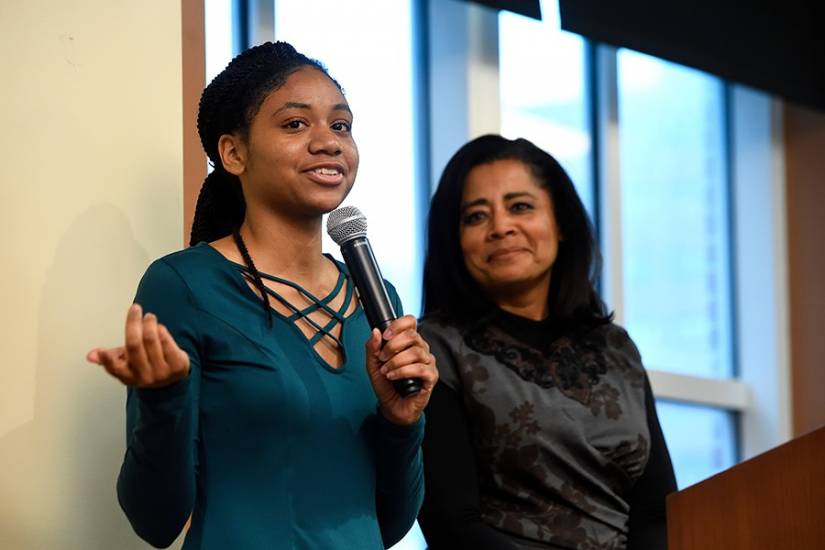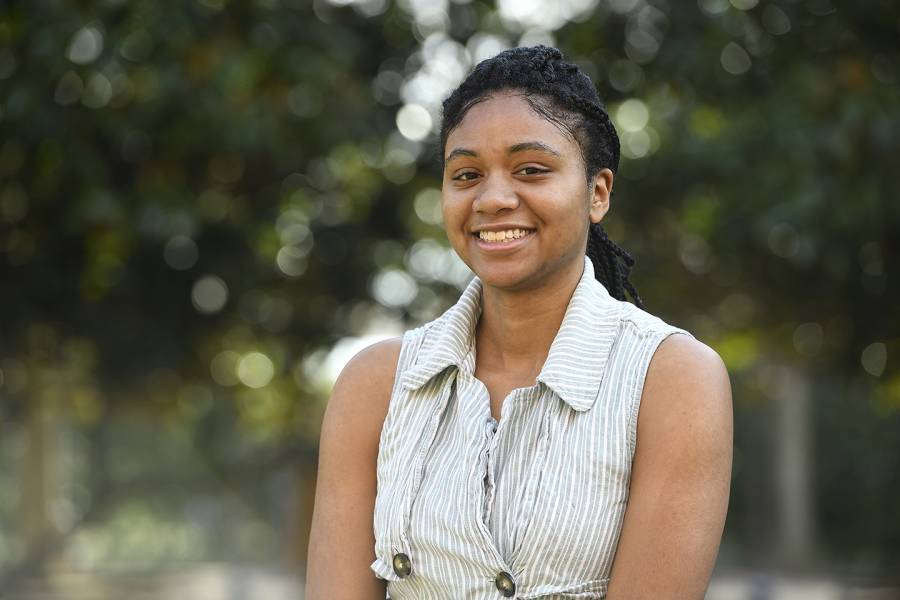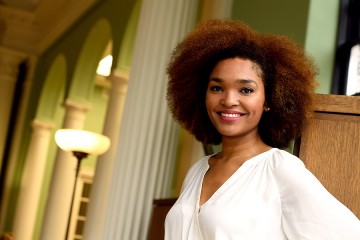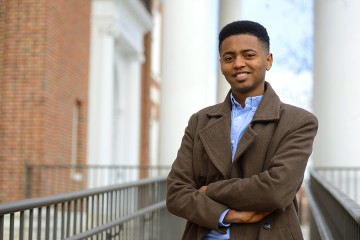In the lab, Maya Foster worked with brain imaging software to allow physicians to track the development of neurological diseases. Outside of the classroom, she created Culture Festival and Voices of Color, events prioritizing the heritage and experience of minority students.
She's also a dancer, a designer, and a chamber music cellist. In all these disciplines, one thing remains constant: she's determined to make an impact.
This summer, Foster, who graduated in December with a degree in neuroscience, will have the chance to deepen her understanding of neurological diseases at a research facility or university in Asia as a part of the Luce Scholars Program. The scholarship provides stipends, language training, and individualized professional placement in Asia for up to 18 college graduates each year.
Recipients work with the program to find professional placements at NGOs, universities, government agencies, private companies, think tanks, and museums. Placements exist in nearly every field, including the arts, journalism, law, medicine, and international relations.
Foster is still deciding where she wants to end up during her year abroad, but she hopes to find a position in a neuro-engineering lab at a medical device company. Upon concluding the program, she plans to pursue a PhD in biomedical engineering and specialize in technologies for imaging and modulating the nervous system.
"I already know a lot about the academic side of this kind of work, but I want to gain more insight into the industry," Foster said. "A lot of the time, industry has more data and resources and money than academic institutions, and when you create something, you're creating devices that are going to be implemented in clinical settings."
Luce Scholars are chosen for their outstanding capacity for leadership, a record of high achievement, and clearly defined career interests with evidence of potential for professional accomplishments. Jeannine Heynes, director of Women & Gender Resources at Hopkins, has worked with Foster on initiatives throughout the university. She describes Foster as a leader on the Homewood campus who is tuned in to the needs of her fellow students.
"Maya's soft-spokenness and quiet demeanor often stand in contrast to the roaring effect of her intelligence, passion, creativity, and care for others," Heynes says. "There is no doubt Maya is an exemplary leader and an inspiration to all who come into contact with her."
Foster said it's been her work with Women and Gender Resources and the Office of Multicultural Affairs that have led to her biggest achievements at Hopkins.
During her sophomore year, Foster attended the seminar Hopkins Women Moving Forward, where she met Hopkins alumna and trustee Renée Chenault-Fattah. The talk reminded Foster of conversations she'd had with her friends and roommates about their desire for a campus event tailored for women of color.
"For some reason, I just felt compelled to ask her to partner with me, and get an event started where we could talk about the issues minority women go through in their lives," Foster says.
Together, Foster and Chenault-Fattah created Voices of Color: A Dialogue With Hopkins Women, an annual dinner that connects Johns Hopkins alumnae with undergraduate women of color to discuss career experiences and shared obstacles. Over the past three years, Voices of Color has continued to grow. Last year more than 60 women came out to discuss issues of mental health and wellness.

Image caption: Maya Foster (left) and trustee Renée Chenault-Fattah (right) at 2018's Voices of Color symposium.
Image credit: Will Kirk / Johns Hopkins University
In her junior year, Foster organized Culture Festival, a celebration bringing together more than 30 Hopkins student groups and 300 students to express the music, art, and traditions of their heritage. Foster said the idea for the festival originated with her longstanding fascination with other cultures.
"I was the kind of person who wanted to go to all of the different cultural heritage events, but oftentimes I would be the only person from outside the culture being celebrated there," Foster says. "I thought we could create an event that would make it more comfortable for people to come out and get exposed to different cultures on campus."
Culture Festival and Voices of Color have grown each year, and Foster has built the infrastructure for them to continue now that she has graduated.
Foster says the support systems at Hopkins have encouraged her to embrace her leadership potential. With the help of faculty, friends, and the staff of OMA and Women and Gender Resources, she's grown into a person prepared new adventures.
"I always wanted to do these kinds of things in high school, but I was scared," Foster says. "But here at Hopkins, I found the faith and courage to stand up and make them happen."
JHU students and graduates can find more information on the Luce Scholarship application process on the website of the university's National Fellowships Program.
Posted in Student Life
Tagged neuroscience, scholarships, luce scholar










